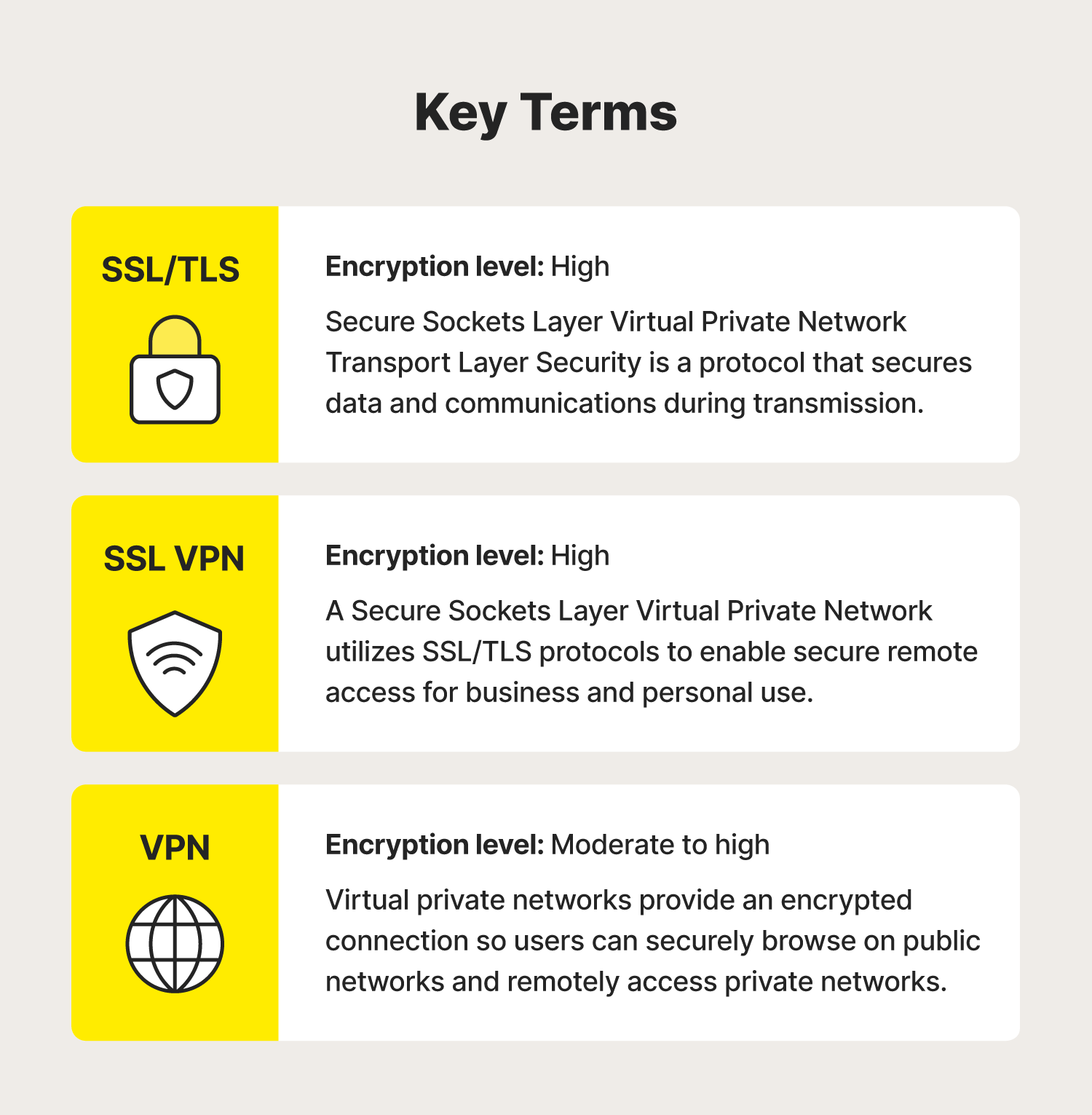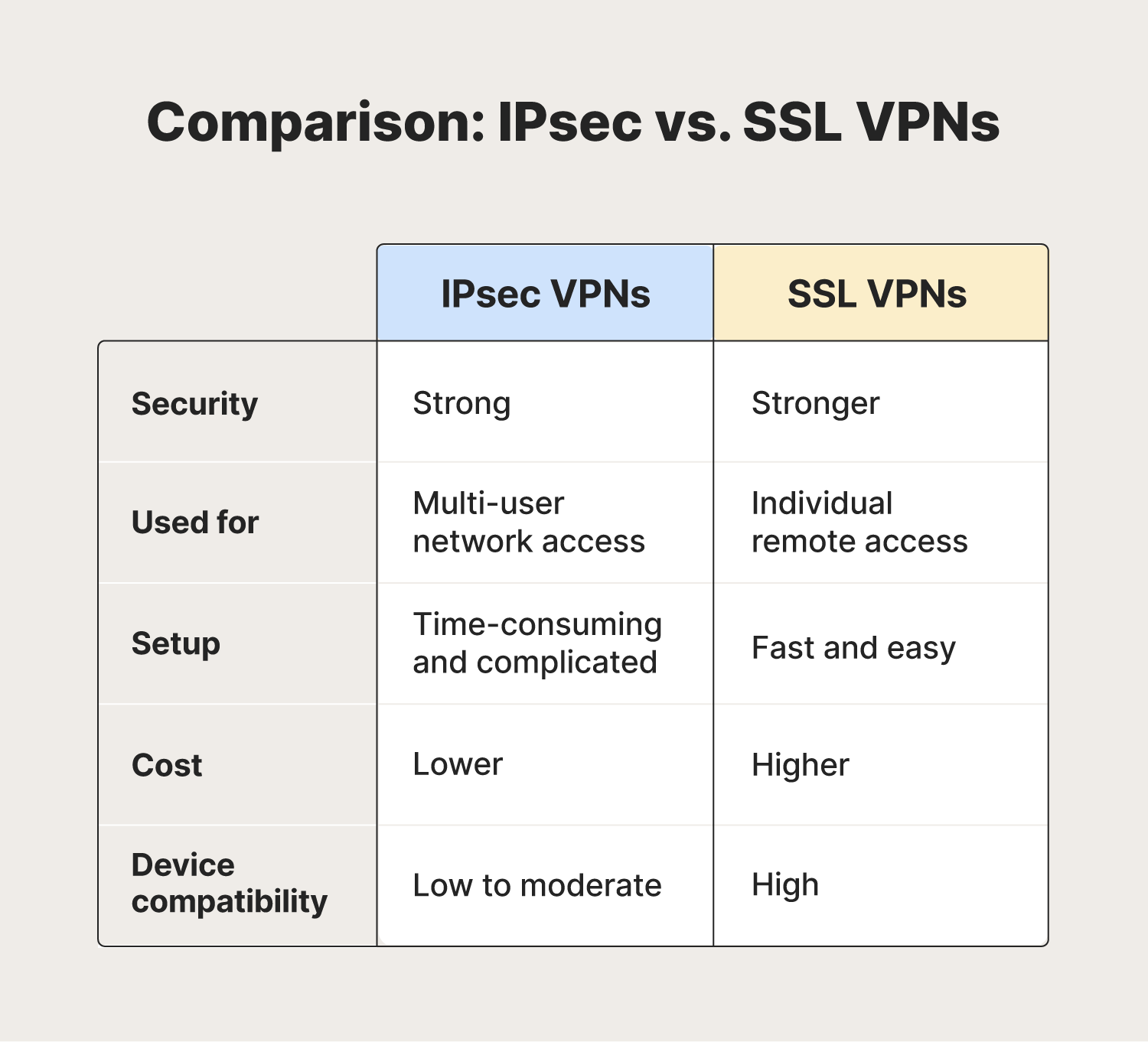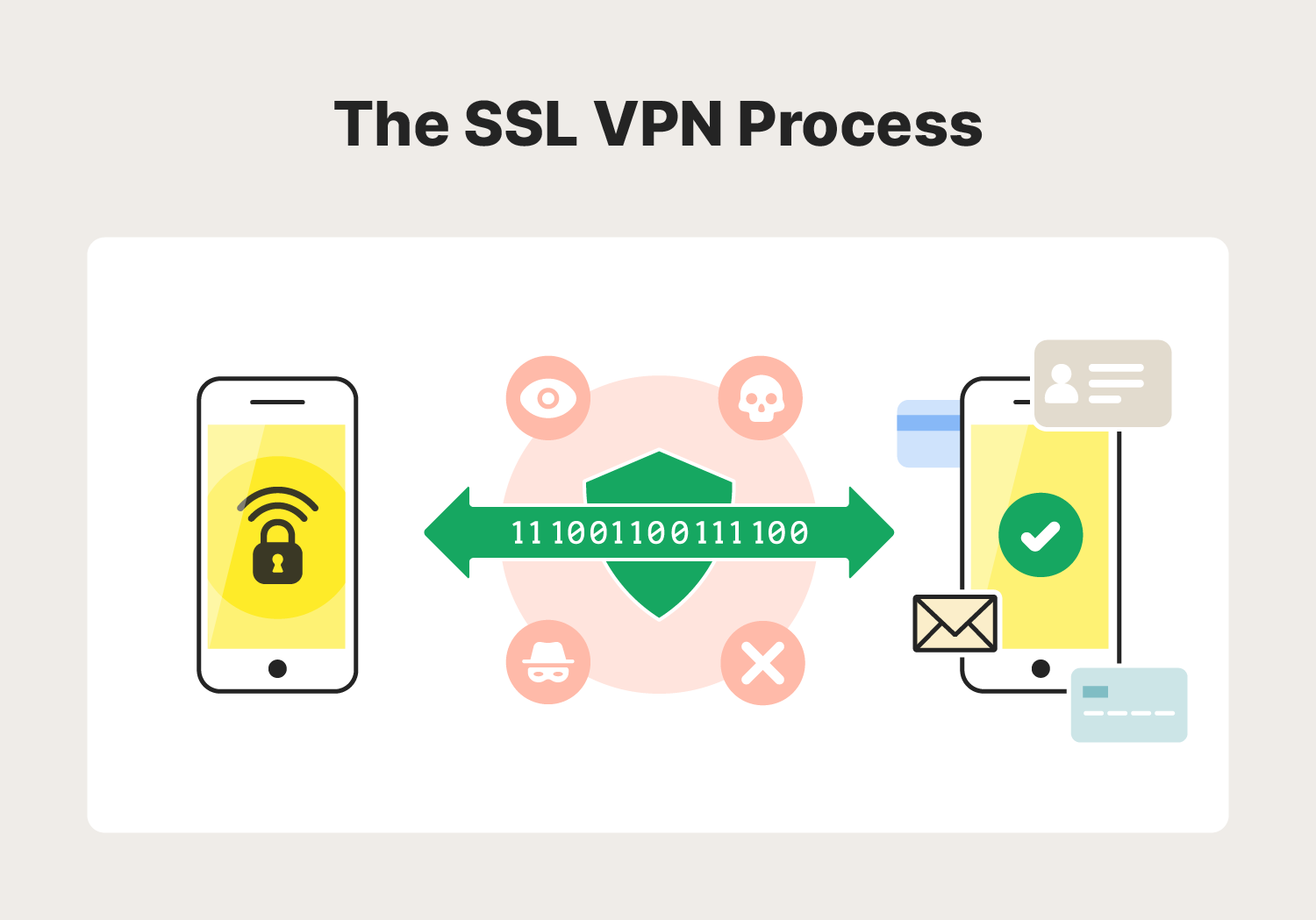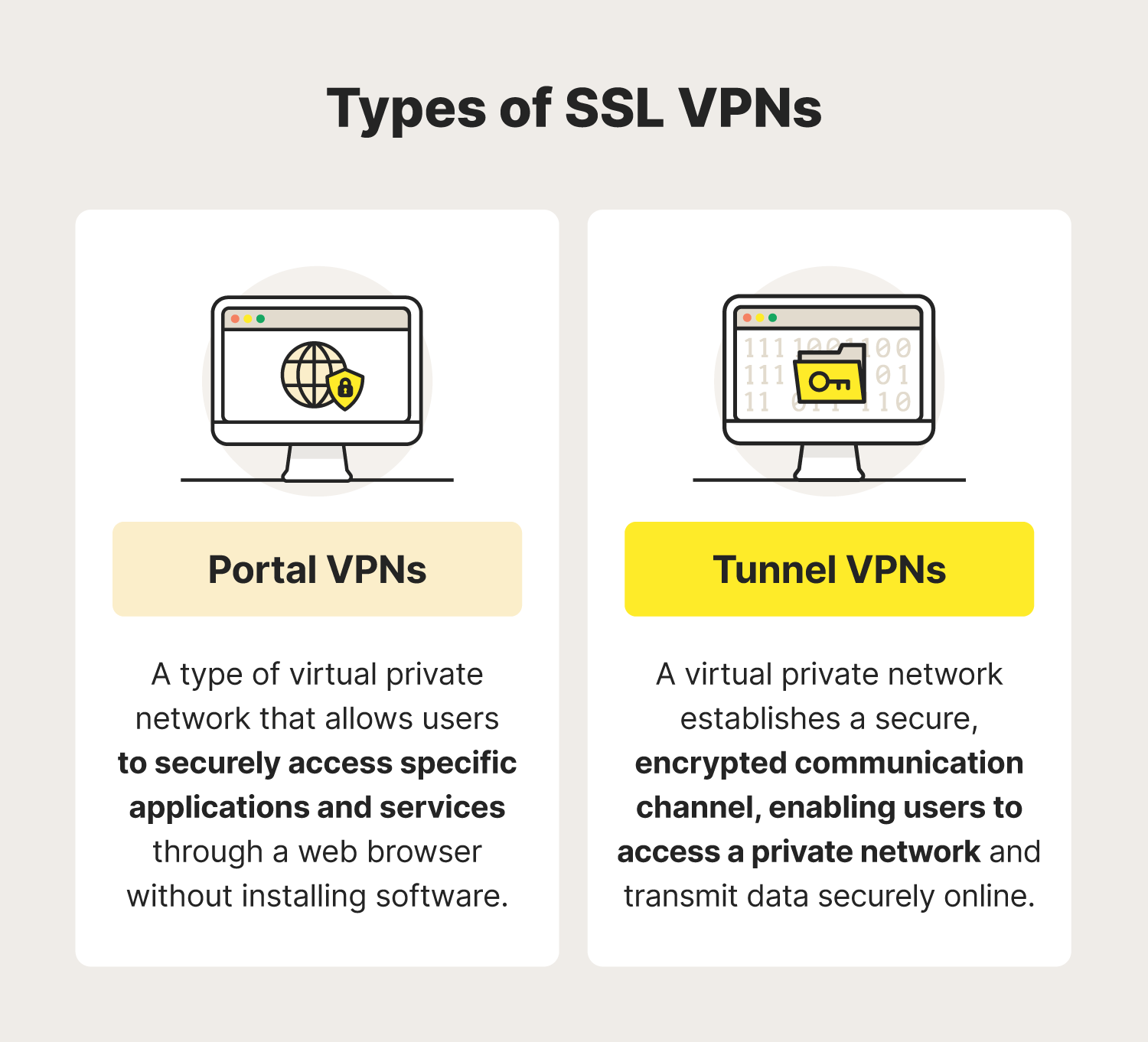What is an SSL VPN and how does it work?
Using an SSL VPN can help protect your privacy whether you’re casually surfing the internet or working remotely. Read on to learn how SSL VPNs work and how they stack up to alternatives like Norton VPN.

An SSL VPN serves a similar purpose as any other VPN—to create a secure internet connection that stops cybercriminals from intercepting confidential data or snooping on private conversations. The primary difference is the underlying technology and protocols.
SSL VPN technology enables users to remotely access private networks in places like schools, hospitals, and businesses from wherever they are. In practice, this might look like an employee using an SSL VPN to securely access company databases, internal servers, and files as they work from home, in the field, or overseas.
Before we get started on what SSL VPNs are and how they work, here are some key terms we’ll discuss throughout the article:

Read on to learn more about SSL VPNs and when to use them.
What is an SSL VPN?
An SSL VPN is a type of VPN that uses SSL, TLS, or SSL/TLS protocols to enable a secure remote internet connection. Typically, SSL VPN users leverage the technology to access internal networks when they are off premises, but still need to encrypt communications and securely access sensitive data.
- Good to know: SSL and TLS are two separate protocols but are referred to as the singular SSL/TLS when discussed together because they share a goal of securing communications.
What’s the difference between SSL VPNs and traditional VPNs?
The biggest difference between SSL VPNs and typical, IPsec VPNs lies in the encryption protocol they use when connecting to the internet. Traditional VPNs usually leverage the IPsec group of networking protocols that use the Authentication Header (AH), Encapsulating Security Payload (ESP), and Internet Key Exchange (IKE) protocols. Meanwhile, SSL VPNs use the SSL or TLS protocols, or a combination of the two.
Below, we’ll explain some other differences between SSL VPNs and IPsec VPNs.
SSL VPNs use SSL/TLS protocols to encrypt data at the transport layer and between devices and servers, prioritizing web-based connections.
Here are some common facts about SSL VPNs:
- They’re fast and easy to configure.
- SSL VPNs are focused on individual remote access.
- The SSL protocol is more secure due to application and service-level permissions.
- They’re generally more expensive because of the need for application-level encryption.
- They’re compatible with more devices because no client software is needed.
On the other hand, IPsec VPNs encrypt data at an individual network level using a combination of hardware and software to protect data sent with identifiable IP addresses.
Here are some more details about IPsec VPNs:
- They require more resources to set up because they rely on client software installation and VPN keys.
- They’re focused on enabling multiple users to access a network at the same time.
- IPsec VPNs use network-level control to allow users to access all services in a network.
- They offer network-layer encryption, which can result in lower costs.
Generally, IPsec VPNs are no better or worse than SSL VPNs, and each type has strengths, weaknesses, and particular use cases. Choosing an IPsec or SSL VPN depends on your specific network requirements, network access control, and compatibility needs.

How do SSL VPNs work?
SSL VPNs are a type of VPN that uses SSL/TLS protocol to establish a private, encrypted channel for the traffic to travel between your device and the internet. After you log in and authenticate your identity with two-factor authentication (2FA), SSL VPNs encrypt the data you send and receive online.
Often, SSL VPNs are browser-based and only work if you’re signed into the network they protect, for example, when you sign in remotely to your employer’s internal network.

Here’s more on the components of SSL VPNs and how they work:
Secure Sockets Layer (SSL) protocol
This cryptographic protocol is a form of network encryption that helps establish a secure and encrypted connection between a device and a website or private network. With SSL encryption, devices must verify each other’s security and data integrity to ensure the messages or data don’t get intercepted.
Given SSL’s high security standards, almost every reputable website has adopted the SSL encryption protocol and uses SSL certificates to ensure stronger site and data security. Some browsers may even flag websites without HTTPS because of privacy concerns.
Transport Layer Security (TLS) protocol
TLS is the latest and greatest version of SSL, offering more robust security features and enhanced algorithms that enhance data security. SSL’s earlier versions, such as POODLE and DROWN, were increasingly vulnerable to cyberattacks, so TLS became the new standard for encryption protocols.
TLS protocols encrypt data as it gets transmitted, authenticate user identities, and establish secure connections between the device and a server. In addition to being more secure, TLS can also be applied to email, messaging, and Voice over Internet Protocol (VoIP) communications, broadening the opportunities for more secure connectivity. While SSL is still common, most websites use TLS encryption today.
Why are SSL VPNs important?
SSL VPNs are important because they provide a secure and encrypted means for remote users to access private networks over the internet, ensuring that confidential data remains private. This is increasingly important for businesses as around 40% of employees have shifted to remote or hybrid working arrangements.
That said, here are a few other reasons SSL VPNs are an important tool to modern organizations with remote workforces:
- Compatibility: SSL VPNs are user-friendly and work with most devices, so employees can utilize them relatively easily.
- Compliance: Highly regulated industries like healthcare can use an SSL VPN to align with HIPAA-mandated security requirements.
- Flexibility: SSL VPNs help enable continuity of work and limit cybersecurity threats as more people work remotely.
2 types of SSL VPNs
The type of SSL connection you use can affect how many network services you can access and how you access the network in the first place. The main types of SSL VPNs are SSL portal and SSL tunnel, which we describe in more detail below:

1. SSL portal VPNs
An SSL portal VPN works like a secure website where you open an internet browser and enter your login credentials to activate the VPN connection. However, these VPNs only support one secure connection at a time and limit your ability to access inaccessible networks and applications via a web browser.
2. SSL tunnel VPNs
An SSL tunnel VPN sends your internet traffic through a secure VPN tunnel. This type of VPN allows you to use a web browser to access multiple network services, including services that may not be web-based, such as enterprise software or proprietary networks.
SSL tunnel VPNs can be especially useful for enterprises with applications or networks that are inaccessible online.
What are the pros and cons of using an SSL VPN?
Using an SSL VPN to connect to the web can help ensure your browsing experience is private by masking your online sessions, hiding your IP address, and cloaking your physical location. Of course, like any technology, SSL VPNs have pros and cons—let’s unpack them.
SSL VPN Pros
If you’re looking for a VPN that works well on a small scale and protects your data and privacy, an SSL VPN might be a good fit. Here are a few advantages of SSL VPNs:
- They’re easy to install and don’t need additional software for configuration.
- SSL VPNs are versatile and work well on different devices and operating systems.
- They’re compatible with restrictive network configurations.
- They’re extremely secure due to the use of the SSL/TLS protocol.
- They use end-to-end encryption.
SSL VPN Cons
SSL VPNs might not be a great fit for companies with extreme security requirements or a need for control because they often rely on browsers to enable remote access. Here are a few shortcomings of SSL VPNs:
- They have limited network-level access control.
- They are vulnerable to some types of malware, such as spyware and Trojans, if browser vulnerabilities are exploited.
- They allow limited network access and protections.
- They can cause reduced performance when handling large volumes of data.
Protect your network connection with Norton
Looking for something more flexible and secure than an SSL VPN? Norton VPN uses the ultra-secure IPsec and WireGuard protocols, and the OpenVPN protocol on Android, to help encrypt the data you send and receive online, while putting versatility at the forefront. And we have a no-log policy, so you can browse to your heart’s content without worrying about your online activity being stored.
Get Norton VPN and start browsing more securely and privately today.
FAQs about SSL VPNs
Still have questions about SSL VPNs? Here’s what you need to know.
What’s the difference between a VPN and an SSL VPN?
All SSL VPNs are VPNs, but not all VPNs are SSL VPNs. SSL is just one of the encryption protocols that VPNs can use. Some examples of VPNs that don’t use SSL encryption protocols include:
- IPsec
- SSTP
- IKEv2
- WireGuard VPNs
Do I need a VPN if I use an SSL?
You don’t need a VPN if you’re using an SSL, but VPNs can further enhance your online protection. Most reputable websites use SSL/TLS, which encrypts data. But using a VPN can help protect you further since an SSL can’t hide your IP address or help prevent web tracking on its own.
Who should use an SSL VPN?
Anyone can use an SSL VPN, although it’s particularly useful for businesses and organizations that need to give their employees and staff remote access to certain enterprise applications.
Can I use an SSL VPN on public Wi-Fi?
Yes, and you should. You can use an SSL VPN on public Wi-Fi to secure your internet connection, encrypt data, and enhance privacy. This is especially important if you plan to access confidential information or financial details on an unsecured network.
Is SSL VPN the same as OpenVPN?
No, SSL VPN and OpenVPN are not the same. SSL VPN is a category of VPNs that use the SSL/TLS protocol. OpenVPN is an open-source VPN software that utilizes SSL/TLS for secure communication.
Editorial note: Our articles provide educational information for you. Our offerings may not cover or protect against every type of crime, fraud, or threat we write about. Our goal is to increase awareness about Cyber Safety. Please review complete Terms during enrollment or setup. Remember that no one can prevent all identity theft or cybercrime, and that LifeLock does not monitor all transactions at all businesses. The Norton and LifeLock brands are part of Gen Digital Inc.





Want more?
Follow us for all the latest news, tips, and updates.